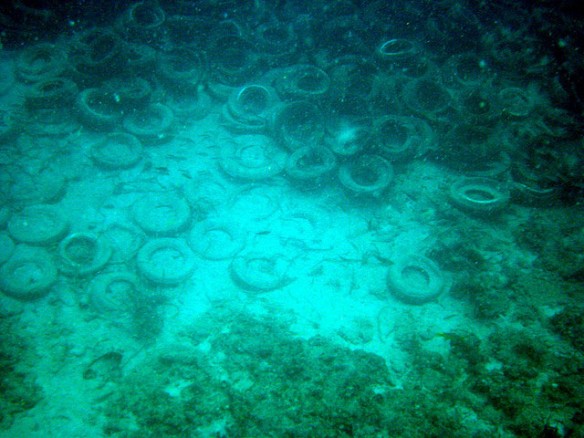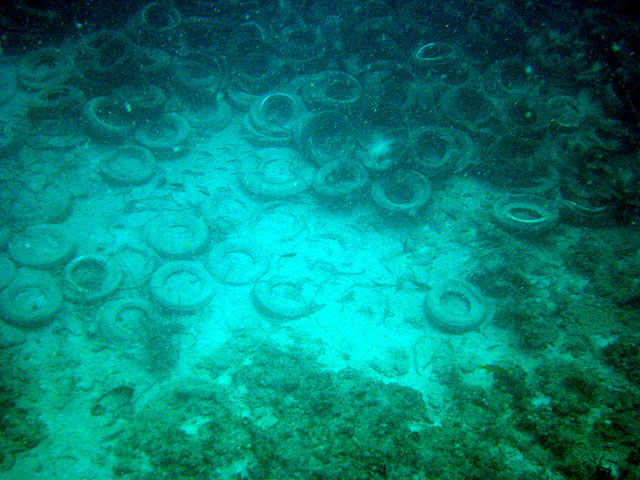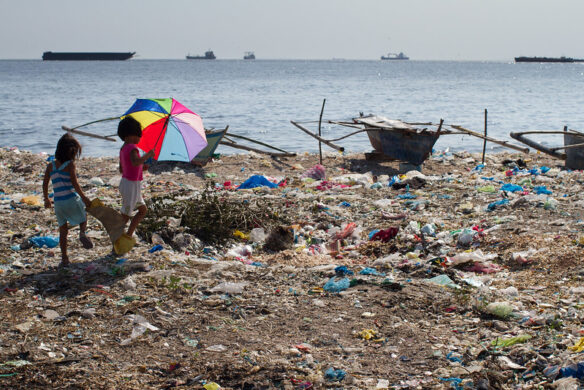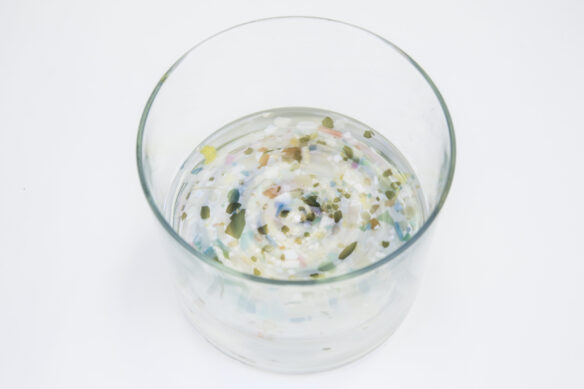
2 Million Tires and the Reef, Florida. Captions and Photo source: ©© Tiswango
Excerpts;
Microplastics from tyres and textiles are a bigger source of marine pollution than the breakdown of larger plastic waste in some areas, says the IUCN.
Up to 30% of plastic released into the oceans each year comes from primary microplastics, not the disintegration of larger pieces, a report found.
Debris from tyre abrasion and synthetic fabrics are the main sources, they say.
The IUCN reviewed data from seven global regions to look at how much of the estimated 9.5 million tonnes of new plastic waste released into the oceans each year comes from primary micro plastics…
Read Full Article; BBC News (02-22-2017)
Plastic now pollutes every corner of Earth, Guardian UK (01-25-2016)
Humans have made enough plastic since the second world war to coat the Earth entirely in clingfilm, an international study has revealed…
Here’s How Much Plastic Ends Up In the World’s Oceans,The Time (02-13-2015)
Every year, 8 million metric tons of plastic end up in our oceans, it’s equivalent to five grocery bags filled with plastic for every foot of coastline…
The Ocean Is Contaminated by Trillions More Pieces of Plastic Than Thought, IOP Science (12-08-2015)
This new study suggests there are 15 to 51 trillion micro plastic particles (those less than 200 millimeters in size) in the world’s oceans, weighing between 93 and 236,000 metric tons. This is about seven times more than scientists had previously estimated…
France and Florida Hit Reverse on Sinking Tyres for Artificial Reefs; Reuters (05-21-2015)
People may be breathing in microplastics, health expert warns; Guardian UK (05-10-2016)
People could be breathing in microparticles of plastic, according to a leading environmental health expert, with as yet unknown consequences on health…
More plastic than fish in the sea by 2050, Guardian UK (01-19-2016)
One refuse truck’s-worth of plastic is dumped into the sea every minute, and the situation is getting worse, according to a new report launched at the World Economic Forum today. New plastics will consume 20% of all oil production within 35 years, up from an estimated 5% today…
Plastic Contaminates Ocean Sourced Table Salt, Scientific American (10-30-2015)
From oil use to ocean pollution: five facts about the plastics industry, Guardian UK (01-24-2016)
The world of plastics is in drastic need of reform. A new report released at Davos highlights some startling facts about the huge environmental and resource impacts of a fast growing plastics industry…
Biodegradable Plastics Are Not the Answer to Reducing Marine Litter, UN News Center (11-23-2015)
Widespread adoption of products labelled ‘biodegradable’ will not significantly decrease the volume of plastic entering the ocean or the physical and chemical risks that plastics pose to marine environment, concluded a UN report released today…
Plastic Pollution / When The Mermaids Cry: The Great Plastic Tide, Coastal Care ©-2009.
For more than 50 years, global production and consumption of plastics have continued to rise. An estimated 300 million tons of plastics were produced in 2015, confirming and upward trend over the past years, according to a new report by the World Economics Forum, released at Davos in January 2016.
Plastic is versatile, lightweight, flexible, moisture resistant, strong, and relatively inexpensive. Those are the attractive qualities that lead us, around the world, to such a voracious appetite and over-consumption of plastic goods. However, durable and very slow to degrade, plastic materials that are used in the production of so many products all, ultimately, become waste with staying power. Our tremendous attraction to plastic, coupled with an undeniable behavioral propensity of increasingly over-consuming, discarding, littering and thus polluting, has become a combination of lethal nature… — © SAF — Coastal Care
To clean up ocean plastics, increase focus on coasts, Science Daily (01-19-2016)
The most efficient way to clean up ocean plastics and avoid harming ecosystems is to place plastic collectors near coasts, according to a new study…
Loving the Ocean Starts at Home, National Geographic (09-08-2016)









